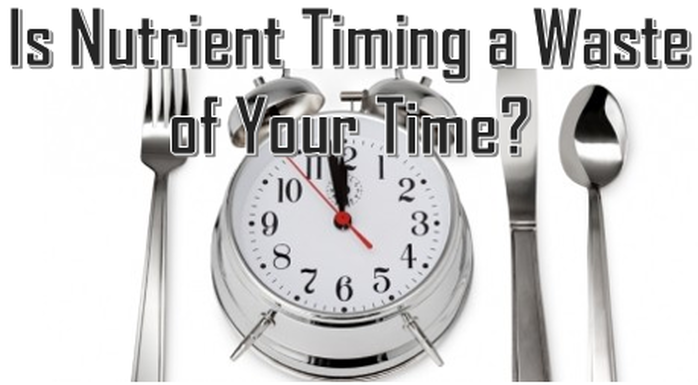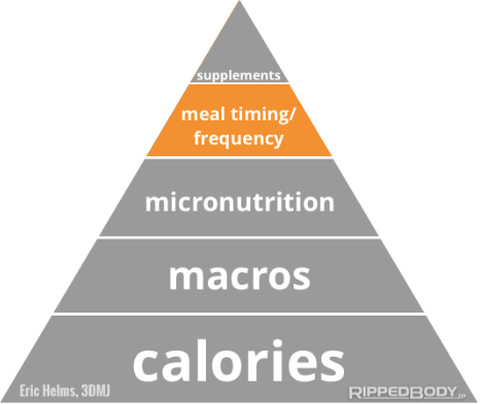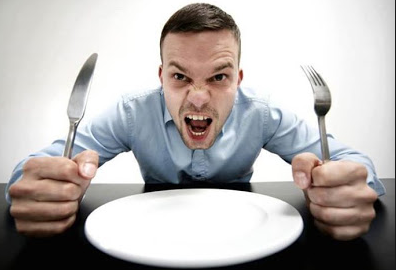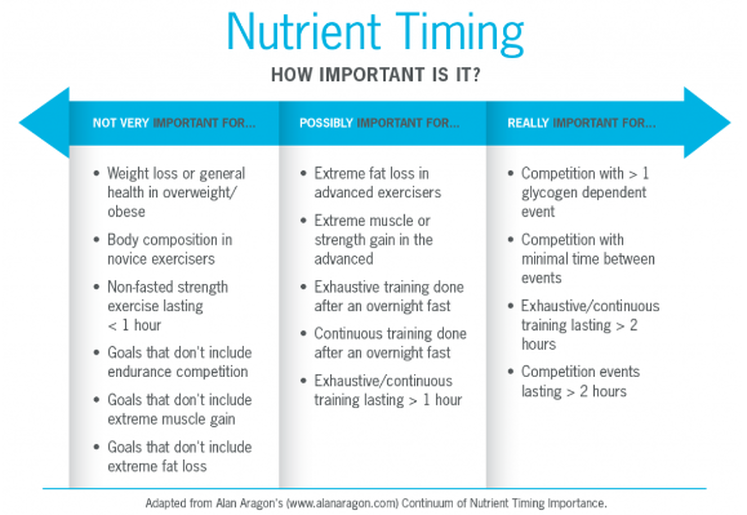Unless you've been living in a cave the last 10 years, you’ve probably heard some of the “unwritten rules” about all this whole nutrient timing thing.
Rules such as:
Only eat carbs around your workout.
Don’t eat carbs after 6 pm.
ONLY eat carbs after 6 pm (carb backloading)
Always consume your post-workout protein shake within half an hour after your workout.
Eat in the morning to boost the metabolism and “stoke the metabolic fire.”
And there’s countless others I’d prefer not to list.
Before we dive deeper into this rabbit hole, let’s take a quick look at what nutrient timing exactly is.
“Nutrient Timing” essentially means consuming specific types of nutrients (such as proteins, carbs, and fats) in specific amounts, at specific times (such as post workouts, pre workout, before bed, in the morning etc.)
Really insightful description there, huh?
Scientists and sports nutritionists first examined the effects of specific nutrients at certain times in the late 1990’s in search of a way to improve sports performance and physical activity.
The data yielded from all of this research seemed to be conclusive and spread through the fitness and nutrition industries like wildfire.
But after decades of further research on the topic, it’s recently been concluded that nutrient timing may not be as important as once thought.
So is nutrient timing imperative for a healthy and aesthetic physique?
No.
Well is nutrient timing ineffective and worthless?
Definitely not.
In certain situations for certain individuals, it can be quite effective over an extended period of time.
Let’s take a further look at some of these situations and see how and if they benefit your specific goals.
Rules such as:
Only eat carbs around your workout.
Don’t eat carbs after 6 pm.
ONLY eat carbs after 6 pm (carb backloading)
Always consume your post-workout protein shake within half an hour after your workout.
Eat in the morning to boost the metabolism and “stoke the metabolic fire.”
And there’s countless others I’d prefer not to list.
Before we dive deeper into this rabbit hole, let’s take a quick look at what nutrient timing exactly is.
“Nutrient Timing” essentially means consuming specific types of nutrients (such as proteins, carbs, and fats) in specific amounts, at specific times (such as post workouts, pre workout, before bed, in the morning etc.)
Really insightful description there, huh?
Scientists and sports nutritionists first examined the effects of specific nutrients at certain times in the late 1990’s in search of a way to improve sports performance and physical activity.
The data yielded from all of this research seemed to be conclusive and spread through the fitness and nutrition industries like wildfire.
But after decades of further research on the topic, it’s recently been concluded that nutrient timing may not be as important as once thought.
So is nutrient timing imperative for a healthy and aesthetic physique?
No.
Well is nutrient timing ineffective and worthless?
Definitely not.
In certain situations for certain individuals, it can be quite effective over an extended period of time.
Let’s take a further look at some of these situations and see how and if they benefit your specific goals.
The Post Workout Anabolic Window
No doubt you’ve heard this one before.
“Bro, be sure to slam your post workout shake of protein and cabs or you’ll lose all your gains!”
The basic idea of the post workout protein shake spawned from the notion that after bouts of intense exercise such as weight training, the body would need immediate replenishment in order to recover and prevent muscle loss.
During intense training, such as sprints and weight training, your body turns into a glucose burning powerhouse in order to sustain energy for training.
Some studies (falsely) proved that not slamming a protein shake within 45 minutes after training would negate all of the effects from that day’s training.
After hearing this shock-tactic information, the golden rule of training now became focused on the post workout shake.
This post workout shake nutrition then snowballed into including not just protein, but also a hefty dose of carbohydrates in order to provide an insulin spike to help shuttle nutrients into our muscles which have been depleted and were thought to soak up any incoming nutrients like a sponge.
This theory was then extended to the pre-workout period, because if one shake is good after training, then one before training will be beneficial too, right?
The cold hard facts of this matter have proven that this “anabolic window” after training actually extends a lot longer than the pre determined 45 minutes after training that was initially conceived.
Instead of some pin-hole sized opening of opportunity to get your post workout recovery optimized, it’s actually more like a wide open barn door.
This means you actually have a few HOURS after your training to maximize your recovery.
So no more shoving people out of your way in the gym so you can rush to your loaded protein shaker and slam your post-workout shake faster than a frat boy slams a jager bomb.
NUMBER OF MEALS AND MEAL TIMING
“What’s the best time to eat” is always a popular question.
I can see why it’s a good question to ask as many people have been spoon-fed this notion that there’s some better times to eat than others.
For decades, most nutrition gurus told people to eat the majority of their calories in the early part of the day and to keep calories (especially carbs) lower later in the evening.
Then suddenly, a host of new gurus came in and proposed the exact opposite, saying we should eat the majority of our calories in the evening as opposed to the morning.
To save time on a long winded explanation about which camp is correct, here’s the reality:
For most average people looking to either lose body fat or increase lean muscle mass while limiting an increase in body fat, there’s no difference.
The key here is energy balance.
Energy balance is the first law of thermodynamics that your body (and everything else in this universe) abides by on a physical level.
What this means is if you consume more calories than your body expends (daily functions, exercise, etc) your body mass (whether fat, muscle, fluids) will increase.
Conversely, if you’re expending more calories than you’re consuming, your body will experience a reduction in lean body mass (fat/weight loss).
This fact cannot be argued, but of course people try.
They’ll make a case for saying “you can eat as much (insert fad super food here) as you want and you won’t get fat. Trust me it works for me.”
For these people, they may see their method work, but they’re overlooking what’s going on behind the label of the “superfood.”
Without evening knowing it, these people are expending more calories than they’re consuming. The energy balance that they’re abiding by is just being masked by the “magical benefits” of their superfood diets.
“What’s the best time to eat” is always a popular question.
I can see why it’s a good question to ask as many people have been spoon-fed this notion that there’s some better times to eat than others.
For decades, most nutrition gurus told people to eat the majority of their calories in the early part of the day and to keep calories (especially carbs) lower later in the evening.
Then suddenly, a host of new gurus came in and proposed the exact opposite, saying we should eat the majority of our calories in the evening as opposed to the morning.
To save time on a long winded explanation about which camp is correct, here’s the reality:
For most average people looking to either lose body fat or increase lean muscle mass while limiting an increase in body fat, there’s no difference.
The key here is energy balance.
Energy balance is the first law of thermodynamics that your body (and everything else in this universe) abides by on a physical level.
What this means is if you consume more calories than your body expends (daily functions, exercise, etc) your body mass (whether fat, muscle, fluids) will increase.
Conversely, if you’re expending more calories than you’re consuming, your body will experience a reduction in lean body mass (fat/weight loss).
This fact cannot be argued, but of course people try.
They’ll make a case for saying “you can eat as much (insert fad super food here) as you want and you won’t get fat. Trust me it works for me.”
For these people, they may see their method work, but they’re overlooking what’s going on behind the label of the “superfood.”
Without evening knowing it, these people are expending more calories than they’re consuming. The energy balance that they’re abiding by is just being masked by the “magical benefits” of their superfood diets.
BREAKFAST IS IMPORTANT…OR IS IT?
Breakfast is a hot topic.
Almost everyone still seems to think its “the most important meal of the day.”
This idea is built on the notion that after being asleep for 8 hours, your body is starving and won’t be able to function without a heaping serving of bacon, eggs, and pancakes.
Again, in the sake of time, here’s the truth:
Some people enjoy eating breakfast. Others just aren’t hungry and prefer to skip out on it.
But there’s no magical health benefit to eating breakfast.
Eating breakfast won’t make you lose fat. In fact, in can have the opposite effect if you’re not conscious of your calorie intake because you’ll be eating more meals and more overall food throughout the day.
Eating breakfast won’t make you stronger. It can if you’re training regularly and maintain a calorie surplus over time.
Eating breakfast won’t make you smarter. This one is person to person, but some people tend to become sluggish and lethargic after a morning meal.
Some people who skip breakfast often experience better cognitive functions and feel sharper until the lunch hour.
It all comes down to personal preference.
If you don’t like having to wake up an extra half hour early to scarf down a bowl of oats you’re not even going to enjoy because you’re not hungry, then pass on breakfast and have your first meal of the day a bit later on.
If you enjoy having a large breakfast before you leave the house each day because it makes you feel better and its enjoyable, then by all means have at it.
Just remember your specific fitness goals when you decide to include or exclude breakfast.
Calories count.
If you’re looking to lose body fat, you’ll need to be in a caloric deficit.
If you’re looking to add body mass, calories will need to be at a surplus.
Breakfast is a hot topic.
Almost everyone still seems to think its “the most important meal of the day.”
This idea is built on the notion that after being asleep for 8 hours, your body is starving and won’t be able to function without a heaping serving of bacon, eggs, and pancakes.
Again, in the sake of time, here’s the truth:
Some people enjoy eating breakfast. Others just aren’t hungry and prefer to skip out on it.
But there’s no magical health benefit to eating breakfast.
Eating breakfast won’t make you lose fat. In fact, in can have the opposite effect if you’re not conscious of your calorie intake because you’ll be eating more meals and more overall food throughout the day.
Eating breakfast won’t make you stronger. It can if you’re training regularly and maintain a calorie surplus over time.
Eating breakfast won’t make you smarter. This one is person to person, but some people tend to become sluggish and lethargic after a morning meal.
Some people who skip breakfast often experience better cognitive functions and feel sharper until the lunch hour.
It all comes down to personal preference.
If you don’t like having to wake up an extra half hour early to scarf down a bowl of oats you’re not even going to enjoy because you’re not hungry, then pass on breakfast and have your first meal of the day a bit later on.
If you enjoy having a large breakfast before you leave the house each day because it makes you feel better and its enjoyable, then by all means have at it.
Just remember your specific fitness goals when you decide to include or exclude breakfast.
Calories count.
If you’re looking to lose body fat, you’ll need to be in a caloric deficit.
If you’re looking to add body mass, calories will need to be at a surplus.
HOW OFTEN SHOULD I EAT?
Firstly, let’s dispel the “eat 7 small meals throughout the day” for increased health benefits idea.
Does anyone really enjoy eating that often? Probably not. If you do, then by all means have at it.
I’ll admit I there once was a period in my life where I did eat 7 times a day. Everyday. For years. I didn’t enjoy it at all, I just thought it was necessary to reach my physique goals.
Looking back at that now, I wish I knew everything I knew now because I wasted so much time stressing over meals and lugging around coolers full of food everywhere I went.
I was all about that Tupperware life you could say. And that’s no way to live.
There was a time when research suggested that eating small meals throughout the day proved to be beneficial for fat loss and health, but that was only in the short term studies.
Evidence now proves that whether you eat 7 small meals that equate to 2500 calories or 3 larger meals that equal the same 2500 calories, there is no difference is health or body composition.
Why is that?
If you guessed energy balance, then you would be correct.
There’s just no getting around this fundamental physics fact.
As long as we eat the right foods, in the right amounts, the number of meals you eat is solely based on personal preference.
NUTRIENT TIMING HAS ITS PLACE
Nutrient timing is a pretty complex topic and by no means is it black and white, yes or no, 1 or zero. It would probably take a whole 200 page book to cover it completely.
So is nutrient timing really not important at all?
Absolutely not.
For most elite level athletes and physique competitors, nutrient timing can make a slight difference, which can mean the difference from performing to win and performing to come in second.
If you’re a novice trainer or someone just looking to make a few changes to lose some weight and improve your health, worrying about meal timing is something you don’t need to be doing.
IT’s the small fundamentals that will yield the greatest benefit. Small things like reducing the amount of excess calories from junk food you’re eating every day, getting a bit more activity by being more active and less sedentary, and making more wholesome food choices.
Instead of worrying about “those potatos you ate at 9 pm last night”, think about the snacks you’re having in between meals that you’re having because you’re bored and not really dying from famine.
Here’s a nutritional hierarchy to follow.
- How much are you eating?
(Recommendation: Eat until satisfied, instead of stuffed - How you are eating?
(Recommendation: Eat slowly and mindfully, without distraction.) - Why are you eating?
(Hungry, bored, stressed, following peer pressure, social cues, triggered by hyper-rewarding foods?) - What are you eating?
(Recommendation: Minimally processed proteins, veggies, fruits, healthy starches, and healthy fats.) - Are you doing #1 to #4 properly, consistently?
(Recommendation: Shoot for 80 percent consistency with these items before moving on.)
6 .When are you eating?
(Now you can consider breakfast, late-night, during your workout, etc.)
Don’t Stress Nutrition Timing
The graphic above dictates how much you should really emphasize nutrition timing.
For most peope, it really isn’t a huge priority, so there’s no point in stressing yourself out about when you’re eating.
Life is stressful enough, don’t add to your stress levels by worrying about when to eat.
Just remember to focus on HOW MUCH you’re eating and the quality of your foods you’re consuming.
Remember, if you’re overweight or out of shape, you didn’t get there overnight. It took some time.
It’ll also take some time to reverse where you are currently at, so be patient and trust the process.
It’s the small everyday choices we make that will add to the bigger picture.
So get up, stay up, be active, and use that 8 pound thinking machine rolling around in your head to make the best decisions possible for your well being.




